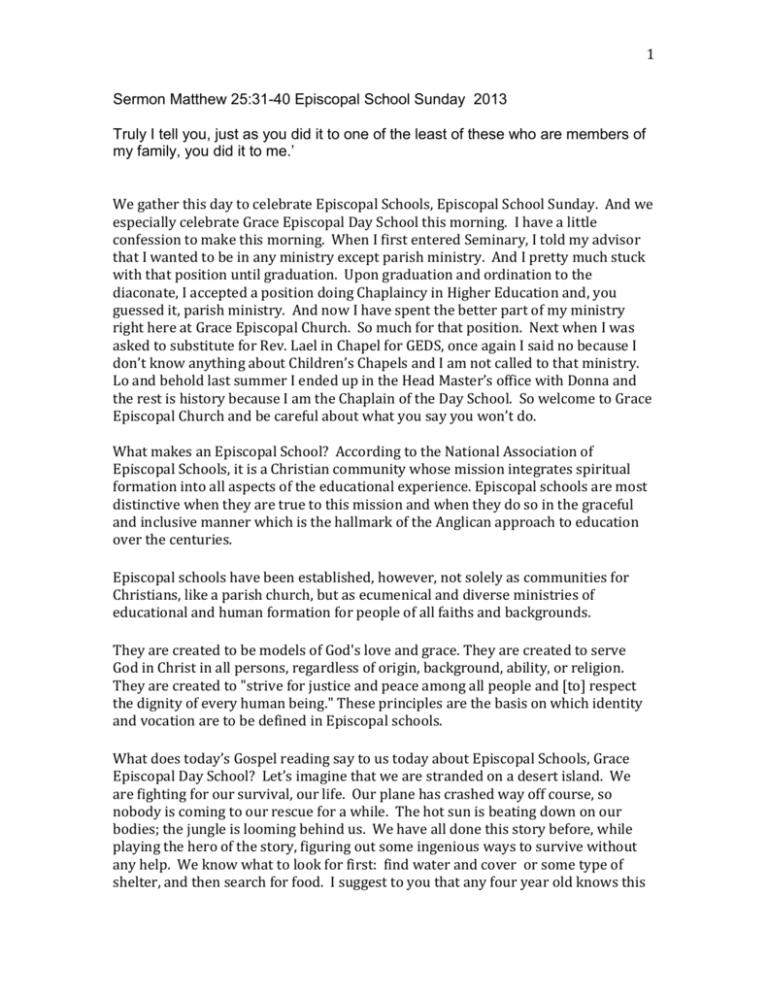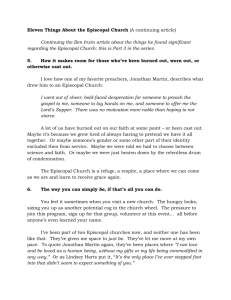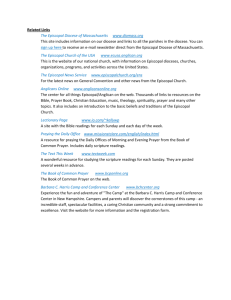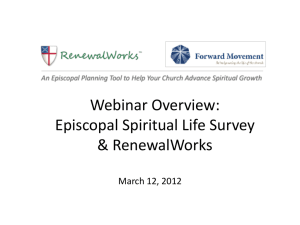EpiscopalSchoolSunda..
advertisement

1 Sermon Matthew 25:31-40 Episcopal School Sunday 2013 Truly I tell you, just as you did it to one of the least of these who are members of my family, you did it to me.’ We gather this day to celebrate Episcopal Schools, Episcopal School Sunday. And we especially celebrate Grace Episcopal Day School this morning. I have a little confession to make this morning. When I first entered Seminary, I told my advisor that I wanted to be in any ministry except parish ministry. And I pretty much stuck with that position until graduation. Upon graduation and ordination to the diaconate, I accepted a position doing Chaplaincy in Higher Education and, you guessed it, parish ministry. And now I have spent the better part of my ministry right here at Grace Episcopal Church. So much for that position. Next when I was asked to substitute for Rev. Lael in Chapel for GEDS, once again I said no because I don’t know anything about Children’s Chapels and I am not called to that ministry. Lo and behold last summer I ended up in the Head Master’s office with Donna and the rest is history because I am the Chaplain of the Day School. So welcome to Grace Episcopal Church and be careful about what you say you won’t do. What makes an Episcopal School? According to the National Association of Episcopal Schools, it is a Christian community whose mission integrates spiritual formation into all aspects of the educational experience. Episcopal schools are most distinctive when they are true to this mission and when they do so in the graceful and inclusive manner which is the hallmark of the Anglican approach to education over the centuries. Episcopal schools have been established, however, not solely as communities for Christians, like a parish church, but as ecumenical and diverse ministries of educational and human formation for people of all faiths and backgrounds. They are created to be models of God's love and grace. They are created to serve God in Christ in all persons, regardless of origin, background, ability, or religion. They are created to "strive for justice and peace among all people and [to] respect the dignity of every human being." These principles are the basis on which identity and vocation are to be defined in Episcopal schools. What does today’s Gospel reading say to us today about Episcopal Schools, Grace Episcopal Day School? Let’s imagine that we are stranded on a desert island. We are fighting for our survival, our life. Our plane has crashed way off course, so nobody is coming to our rescue for a while. The hot sun is beating down on our bodies; the jungle is looming behind us. We have all done this story before, while playing the hero of the story, figuring out some ingenious ways to survive without any help. We know what to look for first: find water and cover or some type of shelter, and then search for food. I suggest to you that any four year old knows this 2 stuff. We feel really good about this story. We had done it all by ourselves, shared the credit with no one. All alone, you are the hero of your own life. You against nature and all of its elements. And you always survive. What a story. This story or scenario feeds right into our wonderful independent natures. We love to think we are completely in charge or control of our lives. Surely we can do it alone, be completely independent. Surely if we work hard enough we won’t need anyone’s help. That is the American ideal: a person who starts with nothing and makes something of themself, all by themself. It is part of our American psyche. It is safe. And if we believe we alone are responsible for our survival, we know what is important and who we can count on. Ourselves. All that matters is me. Me and my self-preservation. Pull yourself up by your bootstraps. The self-made person. The Horatio Alger’s story. We all know that our culture is replete with images and stories about going it alone, making a life for ourselves. We breathe this idea in every day. Now I want you to take that thought and line it up next to the words of Jesus. Your head is starting to spin. In our Gospel reading this morning, Jesus says just the opposite. The opposite would be we are dependent on each other. Pretty radical right? But that is not all that Jesus is saying. Jesus says that our salvation depends on helping others. On being concerned with the other, not with self. Jesus talks about end times. He says that people will be judged righteous or unrighteous depending on, not their ability to do things all by themselves, but rather on how they treated others. This is counter-cultural for us and even so for His time. So what makes our life worthwhile, according to Jesus, is not what we accomplish for ourselves, but rather what we accomplish for others. How can this be true? This goes against everything we know about human nature: Survival of the fittest, the fastest, the smartest, and the most self-interested. But no, Jesus says, go find someone, one of the least of my brothers and sisters, and take care of them. You will be deemed righteous, and be welcomed into the kingdom prepared for you by God. Is there no hope for this idea? Not in the real world, not in our world. It is not as if Jesus does not understand human nature. We agree that he is a pretty smart guy, yes? Jesus understood the basic truth about humanity, the built-in-byGod truth about the meaning of life. We are connected. Not by just geography or language or ideas. We are made human through our interactions with each other. Our worth, our humanity that God hopes for, depends on the well being of every human being. Jesus tells us: When they feed the hungry or care for the sick, they care for Him. It is all the same. You care for one, and you care for all. We are all connected. It is what we would call enlightened self-interest. The preservation of others IS self-preservation. Now that is a story. We have to be told this story, again and again. It’s as if we are pre-programmed though to forget this truth, that other-preservation is in our own best interest. We 3 need reminders, often. Luckily for us, God sends us people who can remind us, in powerful ways. It is a simple message: that we must care for one another, for our own sakes. It is so simple that you would think we would get it, we would know it. But instead on the rare occasion when someone says it again, eloquently, we pay attention, as if it were the first time the sentiment is expressed. We marvel at their wisdom. Care for one another. As if your life depends on it. Self-centeredness does not exist at Grace Episcopal Day School. At Grace Episcopal Day School there is an environment of caring for one another, an environment of nurturing, a student-centered environment. I am grateful to be a small part of that environment through the Chapel. Today, my sisters and brothers, we celebrate Grace Episcopal Day School. Amen.











